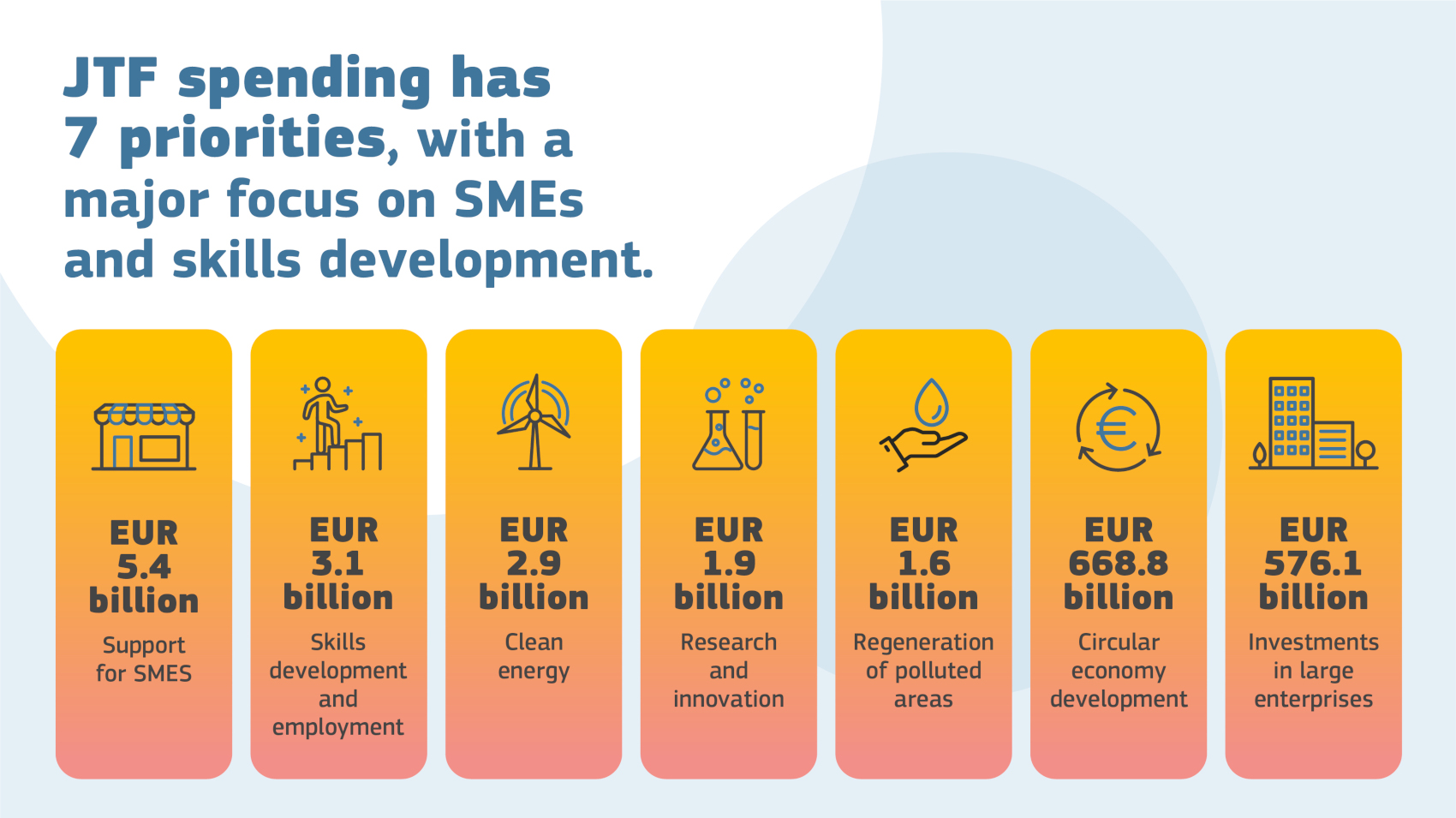
The JTF is intended to ensure balanced socio-economic development through investment in growth sectors that can absorb workers currently in polluting, carbon-intensive industries.
Compared with other cohesion policy funds, the JTF provides more targeted help, geographically and thematically, for the regions that will suffer the greatest negative effects from the green transition.
The JTF is one of the three pillars of the Just Transition Mechanism. The other two are InvestEU and a new public sector loan facility. Combined, they make available EUR 55 billion in investment in the 2021-2027 period.
The JTF represents EUR 19.2 billion, or 5 % of the 2021-2027 cohesion policy budget of EUR 392 billion. The European Regional Development Fund and European Social Fund+ together make up EUR 313.1 billion and the Cohesion Fund EUR 36.6 billion. With national co-financing, the JTF amounts to EUR 25.4 billion.
The top five beneficiaries are Poland, Germany, Romania, Czechia and France.
Helping the neediest
Only the most negatively affected regions in each Member State are eligible for funding. This includes those territories whose economies rely heavily on carbon-intensive industries like steel, cement, or chemicals, or on extraction and processing of fossil fuels, and where these sectors are expected to shrink as they are replaced by renewable energy and clean technologies.
In addition, the JTF can be used to support large enterprises or finance projects that reduce greenhouse gas emissions from factories.
Diversifying economies and developing skills
The JTF has two priorities: diversifying economies to reduce their reliance on a single, polluting sector; and skills development for workers and the unemployed.
The first priority will encourage the establishment of SMEs and fund their research and development activities. The top three categories and the planned EU funding amounts are: SME business development and internationalisation (EUR 2.5 billion); business infrastructure for SMEs (EUR 631.8 million); and incubation, support to spin offs/outs and start-ups (EUR 602.5 million).
Romania, Poland and Germany are the top three Members States who will benefit from this funding.
Support for skills development and job-seekers has as its three priorities: helping workers, firms and entrepreneurs adapt to change (EUR 792.7 million); access to employment (EUR 619.3 million) and infrastructure for vocational education and training (EUR 554 million), to benefit mainly Poland, Germany and France.
Other funding categories to receive attention are youth employment (EUR 89 million), digital skills development (EUR 22.4 million) and equal participation of women in the labour market (EUR 703 806).
Territorial Just Transition Plans
The territories in which the JTF will be implemented are defined in territorial just transition plans, which are agreed on during talks with the European Commission. A total of 67 plans covering 93 areas have been approved.
Each plan includes an analysis of the anticipated economic and social impacts of the green transition, such as job losses, and also how pollution from production processes will be reduced.
Member States are under pressure to use the money quickly. A total of 70 % of the total JTF allocation is concentrated in the first two annual tranches of the operational programmes through which the funding will be used. It needs to be spent by 2025 and 2026 respectively.
To help them do so, countries can use technical assistance available through the operational programmes, or through EU-level instruments. The European Commission’s Just Transition Platform includes information about funding opportunities, working groups for carbon-intensive sectors and regions to discuss solutions, and latest news.
Clean energy
The JTF will finance the development of sectors that are expected to grow and absorb workers from those industries being phased out. These growth sectors include clean energy (EUR 2.9 billion in JTF funding from the EU), research and innovation (EUR 1.9 billion) and the circular economy (EUR 668.8 million).
For clean energy, the JTF’s top three priorities are: renewable energy – solar (EUR 815.5 million); smart energy systems (EUR 411.7 million) and other renewable energy, including geothermal (EUR 287.4 million). Poland, Romania and Germany are the three largest beneficiaries.
These priorities are expected to contribute to realising the Green Deal Industrial Plan, which the European Commission presented in February 2023 to enable the development of the technologies and products needed to reach climate goals.